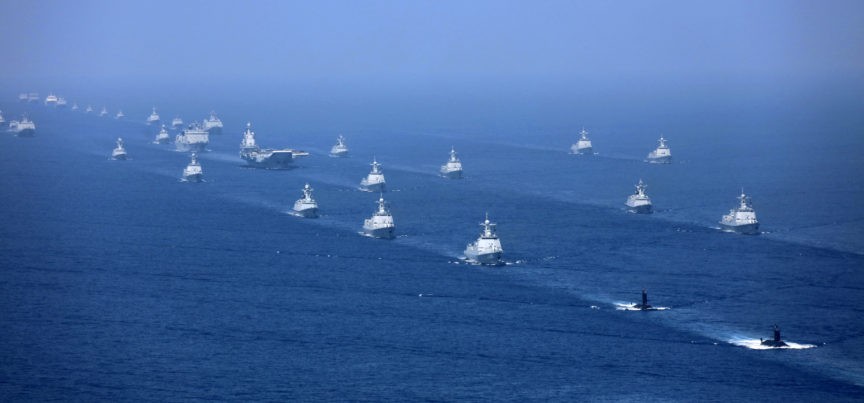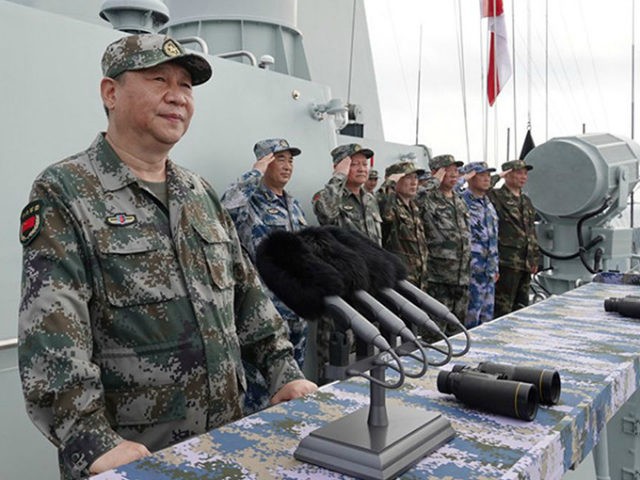Steven Mosher, president of the Population Research Institute and author of Bully of Asia: Why China’s Dream Is the New Threat to World Order, told SiriusXM hosts Rebecca Mansour and Joel Pollak on Tuesday’s Breitbart News Tonight that China could “choke off trade” and “control access” to a critical maritime trade route if allowed to control the South China Sea.
LISTEN:
Mosher explained the importance of the South China Sea as an international maritime trade route. He said, “The South China Sea is surrounded by islands. To the east, you have the Philippines; to the south, you have the Indonesian archipelago; and to get into the South China Sea from the west, you have to go through the Straits of Malacca, which at their narrowest are only a couple of miles wide. All of the oil from the Middle East that flows to China [and] Korea [and] Japan goes through the Straits of Malacca, along with much trade that goes in the other direction carrying goods on container vessels.”
“The South China Sea is a vital trading route,” he continued. “If you can’t go through the South China Sea, you have to go all the way around the Indonesian island of Java and Sumatra. It adds thousands and thousands of miles to your journey. So whoever controls the South China Sea, controls a maritime choke point and can choke off trade, control access almost at will. That’s why China wants to control the South China Sea. This is why the British, centuries ago, seized Singapore and built a naval base there — because it controls the Straits of Malacca entry and egress into this vital sea.”
Mosher described China’s recent naval exercises in the South China Sea as “a demonstration of force aimed at Taiwan.” He said China reflexively “engages in live-fire exercises,” “fires missiles,” “assembles flotilla ships,” and “threatens invasion” in response to Taiwanese expressions of “moving towards being a sovereign state.”
Mosher reflected on Benito Mussolini and Adolf Hitler’s military displays of forces in the lead-up to World War II in describing Chinese President Xi Jinping’s hosting of China’s recent naval exercises. He said, “The South China Sea and Taiwan Straits are two flashpoints in the East Asia theater, and what China did was assemble its entire fleet of naval ships of any size; 48 ships … and about 10,000 men were in these 48 ships. The interesting thing for me was watching Xi Jinping, the new red emperor, who was onboard one of the destroyers. He gave a rousing speech to the assembled seamen there, talking about how China must build a first-rate [and] mighty people’s navy, and the nation’s rise requires protection, and it needs to confront threats in the South China Sea, and it needs to confront threats vis-a-vis Taiwan separatism. So this was a very militaristic display. It reminded me of Mussolini reviewing his navy in the days leading up to World War II or Hitler reviewing his Panzer divisions. There you have Xi Jinping, the new red emperor, dressed in a military uniform giving a very militaristic speech to his assembled servicemen who are shouting in unison praises of President Xi Jinping. It should send a chill through the spine of anyone who’s familiar with the history of the last few decades.”

In this photo released on April 12, 2018, China’s Liaoning aircraft carrier is accompanied by navy frigates and submarines in the South China Sea conducting the largest naval drill in the communist regime’s history. China conducted live-fire military exercises in the Taiwan Strait amid heightened tensions over increased American support for Taiwan. (Li Gang/Xinhua via AP)
Mansour asked Mosher what China’s most recent military exercises were a response to.
Mosher replied, “There are a couple of things that are happening here. One is the United States Navy is engaging in freedom of navigation operations in the South China Sea. We’re basically saying to China that this has always been international waters. When I was a naval officer some years ago, we used to sail regularly through the South China Sea. No one disputed our right of passage. This is virtually open ocean. Now that China has built these artificial islands in the middle of the South China Sea, militarized them with runways and seaports, and stationed naval vessels and marine personnel, they suddenly claim the entire sea is off-limits and you need to get permission from them to go through it. That’s nonsense. So we recently sailed a USS aircraft carrier through the South China Sea, and I think China’s answer was to assemble virtually all of its warships and say, ‘You’re not going to get free access to the sea, anymore.’”
Mosher added, “China’s also unhappy about a couple of things that happened in Taiwan. One of them, of course, is the election of President Tsai Ing-wen, and she is a strong leader who represents a party called the Democratic Progressive Party, which in the two-party system of Taiwan is one of the main political parties — the other is the nationalist party — and they’ve taken power of not just the presidency with President Tsai, but they’re also in charge of the legislature. They have an absolute majority in the Legislative Yuan. President Tsai wants to preserve Taiwan’s de facto independence. She’s made that very clear. That upsets China. China is also upset by the fact that we just passed, in the United States, a law, which for the first time in 35 or 40 years, enables high-level contacts with the island so that we can have assistant secretaries of state go over and visit the island. That was not allowed in previous years. We can have Taiwan officials visit the United States. Some listeners may recall, every time President Tsai wants to go through Hawaii to Central America to visit some of their allies there, there is a diplomatic firestorm at the fact that she sets foot in the United States. We have a new law that says she can do that. China is upset by that.”
Mosher continued, “China is also upset by the fact that we have now agreed to provide submarine technology, manufacturing technology to the island of Taiwan. So that means we’re going to help them build submarines. We’re going to equip those submarines with sonar, with torpedoes, with modern electronics system. That will protect Taiwan against the danger of a blockade which is always a danger for an island country. China’s incensed about that because, to the extent that Taiwan is able to defend itself, it becomes less vulnerable to pressure from China, and that’s what these displays are all about. That’s what these military exercises and live-fire exercises are all about. Threatening and trying to cow Taiwan to returning to the embrace of the motherland, and the only thing they do is drive the de facto independent country of Taiwan further and further away. The more threats and bluster and dangerous actions come to mainland China, the less the Taiwanese people have to do with Beijing.”
Mansour asked Mosher about the potential of war arising from tensions between China and America, stating, “It does sound worryingly familiar to the last time we saw an imperial power in the Pacific do this kind of saber-rattling, and I’m talking about World War II. It seems frightening that this could get out of hand very easily with one wrong step. Am I overthinking this? Is this a concern?”
Mosher responded, “It’s absolutely a concern for a number of reasons. One is that Xi Jinping, the new red emperor, is modeling himself after Mao Tse-tung, who was one of the great mass murderers of recent history, and he’s concentrating all power in his hands. He’s just displaying the same kind of megalomania that people like Joseph Stalin and Adolf Hitler displayed. The idea that he alone can rule and control his vast country and his vast people is troubling — that, along with his cult of personality, which means that no one dares to criticize anything he says or does. He’s been elevated to the altars of being a virtual demigod in China. People have posters of him in their houses. They have little medallions with his face on them in their cars hanging from their rear-view mirrors. They read his collective works. They quote him incessantly on the state-owned media. They censor criticism of Xi Jinping. That personality type, I think, is a danger to his own people and to the world at large.”
Mosher added, “The second thing that’s happening here is that China is growing economic and military might, combined with cutting-edge technology, much of which comes from the United States, and much of that is stolen or forced transfers of technologies from U.S. companies to Chinese companies. So China is now able to build a first-rate military and act on its regional and global ambitions. … All of these things seem to be coming to a head at the same time. The means: the modern military that China is building. The end: of regional and then global domination, combined with Xi Jinping’s particular personality. It’s a very inflammatory mix.”
Mosher called for a holistic strategy to curb China’s geopolitical ambitions, rejecting piecemeal approaches he linked to diplomats.
“We have to focus not just on one issue at a time, which I think is the preference of diplomats,” he said. “That’s not how you deal with a country like China. You move forward on all fronts. You’re not playing man-to-man issue-based defense. You’re playing a full-court offense. You move forward in all domains. You challenge them in the South China Sea. You help to build up Taiwan’s ability to defend itself. You strengthen your alliances with South Korea and Japan and other countries in the region. You pressure them on trade. You stop technological theft. You have to do all these things simultaneously if you want to check the possibility of aggression, and that’s what we’re doing.”
Mosher praised the Trump administration’s personnel, highlighting CIA Director Mike Pompeo’s slated transition to secretary of state and President Donald Trump’s economic adviser, Larry Kudlow. He remarked, “You’ve got a team over there that has no illusions about the danger that China poses to the world.”
Breitbart News Tonight broadcasts live Monday through Friday on SiriusXM’s Patriot channel 125 from 9:00 p.m. to midnight Eastern (6:00 p.m. to 9:00 p.m. Pacific).
Follow Robert Kraychik on Twitter @rkraychik.

COMMENTS
Please let us know if you're having issues with commenting.